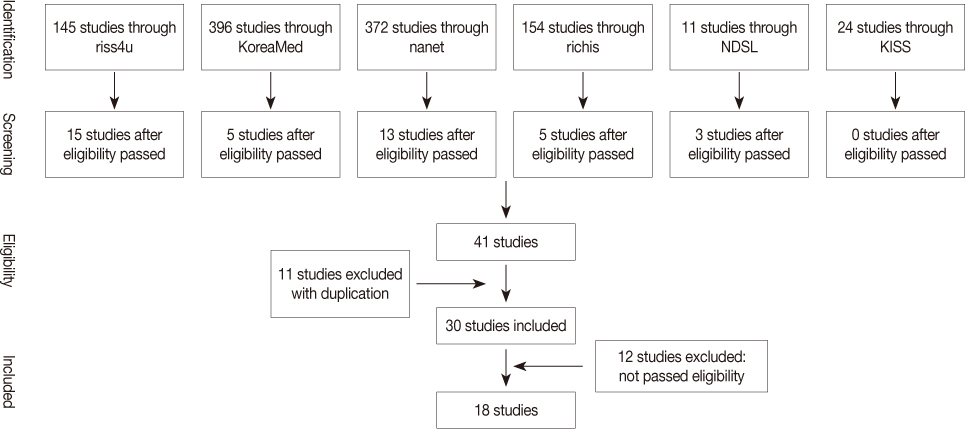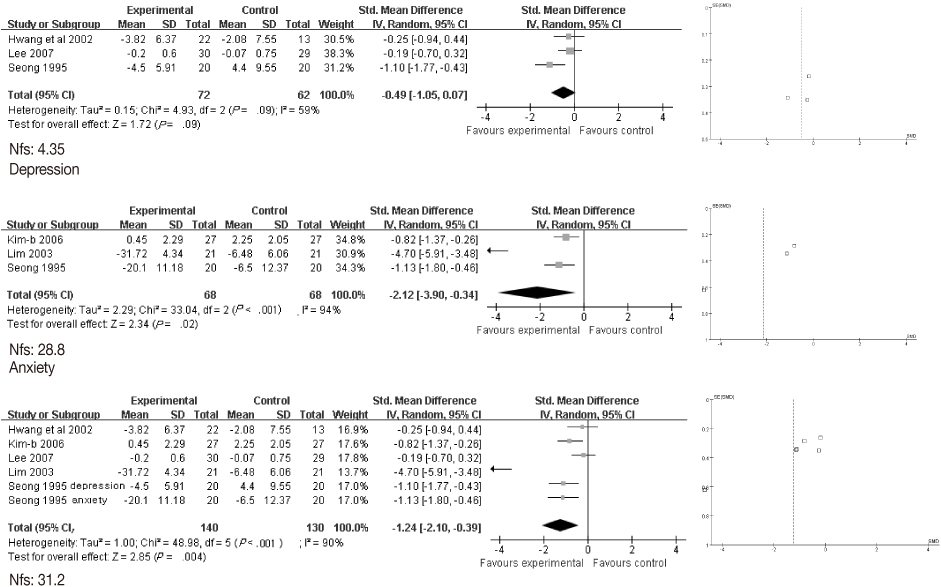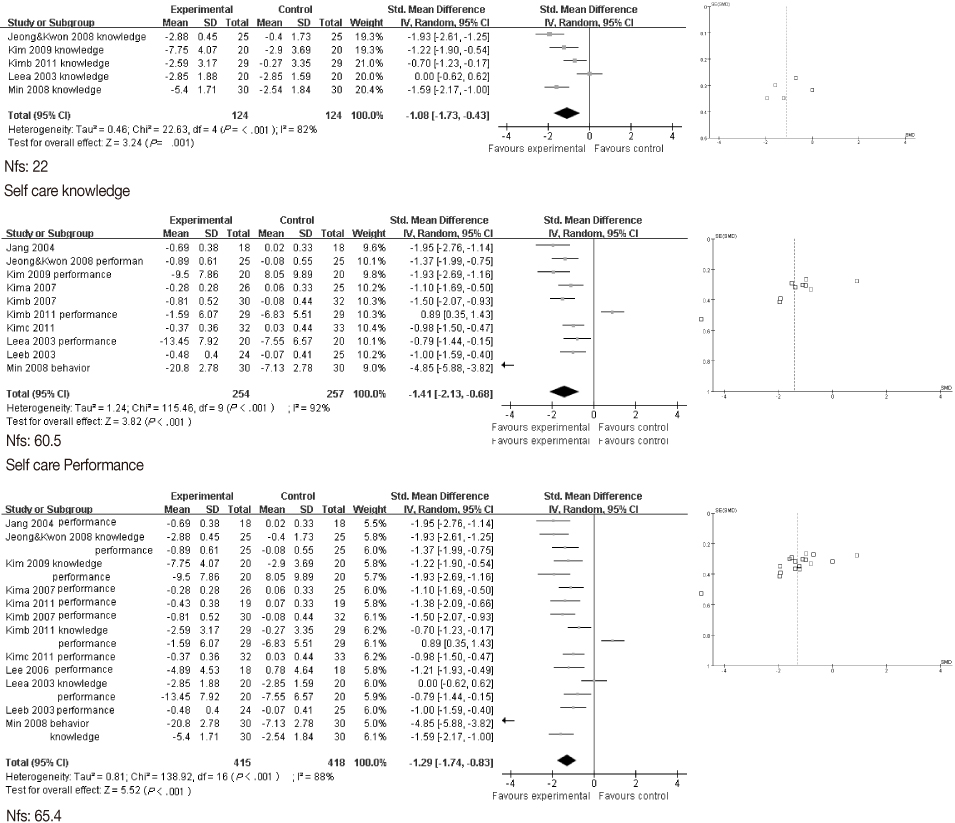The Effect of Patient Education Interventions on Distress, Self-Care Knowledge and Self-Care Behavior of Oncology Patients: A Meta-Analysis
- Affiliations
-
- 1Department of Nursing, Sahmyook University, Seoul, Korea. ohpj@syu.ac.kr
- KMID: 2168790
- DOI: http://doi.org/10.5388/aon.2012.12.4.257
Abstract
- PURPOSE
The purpose of this study was to evaluate the effectiveness of patient education interventions on distress, self-care knowledge and self-care behavior in cancer patients.
METHODS
A total of 1,102 studies were retrieved from 6 electronic databases in Korea. From these studies, 18 studies met the inclusion criteria with a total of 850 participants. Two authors independently assessed the methodological quality by Cochrane's Risk of Bias and Methodological Items for Non Randomized Studies. The data were analyzed by the RevMan 5.1 program of Cochrane library.
RESULTS
Overall effect size of education interventions on anxiety was -2.12 (95% CI: -3.90, -0.34) (p<.001). The effects on self-care knowledge and self care behavior were -1.08 (95% CI:-1.73, -0.43) (p=.001), and -1.41 (95% CI: -2.13, -0.68) (p<.001), respectively. Publication bias was detected as evaluated by funnel plot, but the fail-safe number was moderate.
CONCLUSION
This study suggests that patient education interventions can relieve anxiety and self-care. Further randomized controlled trials studies are needed to evaluate the effects of patient education intervention on depression.
Keyword
MeSH Terms
Figure
Cited by 4 articles
-
Development of a Self-Care Performance Scale for Patients with Stomach Cancer after Gastrectomy
Min Kyung Jeon, Geum Ja Park
Asian Oncol Nurs. 2016;16(2):67-74. doi: 10.5388/aon.2016.16.2.67.Relationships between Attitude Towards Treatment, Distress, and Decision Conflict among Cancer Patients Receiving Chemotherapy
Hyun Mi You, Eun Young Park
Asian Oncol Nurs. 2019;19(4):242-251. doi: 10.5388/aon.2019.19.4.242.Meta- analysis of Psychosocial Interventions to Reduce Pain in Patients with Cancer
Pok Ja Oh, Suk Jung Han
J Korean Acad Nurs. 2013;43(5):658-668. doi: 10.4040/jkan.2013.43.5.658.Cognitive Behavioral Therapy for Psychological Distress, Self Care and Quality of Life in Patients with Cancer: A Meta-analysis
Pok Ja Oh, Eun Ai Lee
Korean J Adult Nurs. 2013;25(4):377-388. doi: 10.7475/KJAN.2013.25.4.377.
Reference
-
1. Choi JY, Yang JJ. Effect of a multidisciplinary and individualized educational program on the need for caring among patients with cancer under radiotherapy. J Korean Oncol Nurs. 2008. 8:17–23.2. Galway KM, Black A, Cardwell CR, Mills M, Donnelly M. Psychosocial interventions to improve quality of life and emotional wellbeing for recently diagnosed cancer patients (protocol). Cochrane Database Syst Rev. 2012. 11:CD007064.3. Hersch J, Juraskova I, Price M, Mullan B. Psychosocial interventions and quality of life in gynecological cancer patients: A systematic review. Psychooncology. 2009. 18:795–810.
Article4. Kim JN, Iee R. A review of research on the psychosocial interventions for the cancer patients. Korean J Health Psychol. 2008. 13:329–357.
Article5. Raingruber B. The effectiveness of psychosocial interventions with cancer patients: An integrative review of the literature (2006-2011). ISRN Nurs. 2011. 2011:638218.
Article6. Osborn RL, Demoncada AC, Feuerstein M. Psychosocial interventions for depression, anxiety, and quality of life in cancer survivors: Meta-analyses. Int J Psychiatry Med. 2006. 36:13–34.
Article7. Meyer TJ, Mark MM. Effects of psychosocial interventions with adult cancer patients: A meta-analysis of randomized experiments. Health Psychol. 1995. 14:101–108.
Article8. Fawzy FI, Fawzy NW. A structured psychoeducational intervention for cancer patients. Gen Hosp Psychiatry. 1994. 16:149–192.
Article9. Rehse B, Pukrop R. Effects of psychosocial interventions on quality of life in adult cancer patients: Meta analysis of 37 published controlled outcome studies. Patient Educ Couns. 2003. 50:179–186.
Article10. Barsevick AM, Sweeney C, Haney E, Chung E. A systematic qualitative analysis of psychoeducational interventions for depression in patients with cancer. Oncol Nurs Forum. 2002. 29:73–85.
Article11. Oh PJ. An intergrative review of oncology nursing research in Korea: 2003-2008. J Korean Oncol Nurs. 2010. 10:80–87.12. Lee HS. The effect of individualized education and telephone counseling on self-care knowledge, self-efficacy and performance in chemotherapy patients [dissertation]. 2009. Jinju: Gyeongsang National Univ..13. Kim MY, Oh PJ. Meta-analysis of the effectiveness on foot-reflexo-massage for cancer patient. J Korean Oncol Nurs. 2011. 11:127–135.
Article14. Jang SY, Park JS. The Meta-analysis of the effect of acupressure for nausea and vomiting in cancer patients receiving chemotherapy. J Korean Oncol Nurs. 2011. 11:116–126.
Article15. Kim SY, Park JE, Seo HJ, Lee YJ, Son HJ, Jang BH, et al. NECA's guidance for undertaking systematic reviews and meta-analysis for intervention. 2011. Seoul: National Evidence-based Healthcare Collaborating Agency.16. Cohen J. Statistical power analysis for the behavioral science. 1988. 2nd ed. New Jersey: Lawrence Erlbaum Associates.17. Lee J. Meta-analysis. J Korean Endocr Soc. 2008. 23:361–378.
Article18. Oh SS. Meta-analysis: Theory and practice. 2009. Seoul: Konkuk Univ..19. Goedendorp MM, Gielissen MF, Verhagen CA, Bleijenberg G. Psychosocial interventions for reducing fatigue during cancer treatment in adults (Review). Cochrane Database Syst Rev. 2009. 21(1):CD006953. http://onlinelibrary.wiley.com/doi/10.1002/14651858.CD006953.pub2/pdf.20. Schneider S, Moyer A, Knapp-Oliver S, Sohi S, Cannelia D, Targhetta V. Pre-intervention distress moderates the efficacy of psychosocial treatment for cancer patients: A meta-analysis. J Behav Med. 2010. 33:1–14.
Article21. Devine EC. Meta-analysis of the effect of psychoeducational interventions on pain in adults with cancer. Oncol Nurs Forum. 2003. 30:75–89.
Article22. Sheard T, Maguire P. The effect of psychological interventions on anxiety and depression in cancer patients: Results of two meta-analyses. Br J Cancer. 1999. 80:1770–1780.
Article23. Williams S, Dale J. The effectiveness of treatment for depression/depressive symptoms in adults with cancer: A systematic review. Br J Cancer. 2006. 94:372–390.
Article24. Oh PJ, Kim YH. A meta-analysis of spiritual intervention studies on the biological, psychological, and spiritual outcomes. J Korean Acad Nurs. 2012. In press.25. Lee SH. The effect of teaching methods on self-care knowledge and performance in patients with cancer [dissertation]. 2003. Seoul: Yonsei Univ..26. Lim EJ. The effects of nursing information on uncertainty and anxiety in post-operative gastric cancer [dissertation]. 2003. Busan: Catholic Univ..27. Orem DE. Nursing concepts of practice. 1991. 4th ed. St. Louis: Mosby-Year Book Publishers.28. Dodd MJ, Miaskowski C. The PRO-SELF Program: a self-care intervention program for patients receiving cancer treatment. Semin Oncol Nurs. 2000. 16:300–308.
Article29. Oh PJ, Lee EO, Tae YS, Um DC. Effects of a program to promote self-efficacy and hope on the self-care behaviors and the quality of life in patients with leukemia. J Nurs Acad Soc. 1997. 27:627–638.
Article30. Altman DG, Schulz KF, Moher D, Egger M, Davidoff F, Elbourne D, et al. The revised CONSORT statement for reporting randomized trials: Explanation and elaboration. Ann Intern Med. 2001. 134:663–694.
Article
- Full Text Links
- Actions
-
Cited
- CITED
-
- Close
- Share
- Similar articles
-
- The Effect of Structured Patient Education on Knowledge and Behavior about Selfcare in Hemodialysis Patients
- Effect of the Structured Education for Knowledge of Hepatitis B Type and Self Care Behavior in Chronic Hepatitis B Patients
- Development and Evaluation of a Web-based Ostomy Self-care Education Program
- Psychological Aspects of Care in Cancer Patients in the Last Weeks/Days of Life
- The Effects of Advance Care Planning on Decision Conflict and Psychological Distress: A Systematic Review and Meta-Analysis of Randomized Controlled Trials




